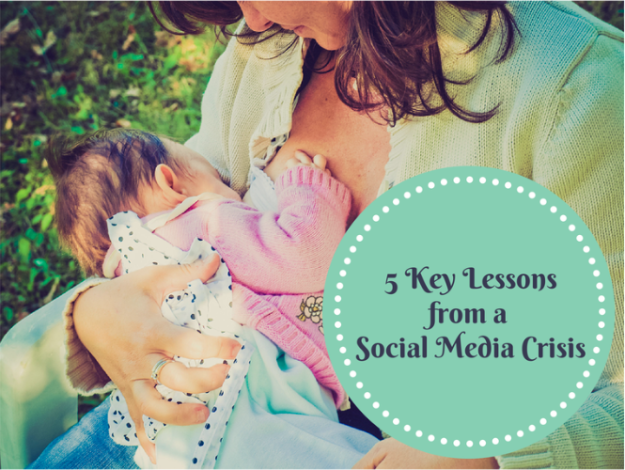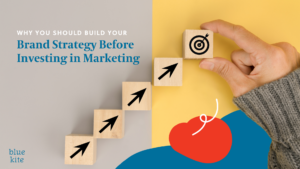Today, I bring you a post from one of our newest team members, Danielle Ali.
As the mother of a 9-month-old kiddo, I run in a few “mommy” circles online. Plenty of conversations come and go every day, but recently
one personal story sparked a social media showdown.
A mother of four, Renee Villatoro, visited the amusement park Kentucky Kingdom. While there, she was breastfeeding her baby under a nursing cover when a park employee approached her and asked her to feed her child in the restroom.
Have you ever been in an amusement park bathroom!? That’s not any place I’d want to have my lunch!
One single post by Renee’s friend in a Facebook group for Louisville mothers was all it took for folks to start flocking to her defense. Dozens began posting to the Kentucky Kingdom Facebook page, inquiring about the official policy, and asking the park if they knew that asking breastfeeding moms to relocate or cover up is against the law.
A Facebook Firestorm
How did Kentucky Kingdom react to the outrage on Facebook?
They deleted Facebook posts and comments from frustrated fans. Then, they fanned the flame by posting a status reiterating their unlawful stance (see below), with no apology to Renee. They even warned fans against making future posts on their Facebook page

Infuriated by this action, many moms contacted news outlets about what Kentucky Kingdom was doing. It wasn’t long before Kentucky Kingdom had a full-blown media crisis on their hands. Soon, the story had escalated beyond social media and had started to become fodder for the Louisville news outlets and even the Huffington Post.
After days of increasing protests, the folks at Kentucky Kingdom finally realized they needed to change course. Their CEO posted a personally written statement that, while still lacking, at least acknowledged that their policy was wrong and showed attention was being paid to the matter. The angry posts died down, but the PR damage had been done.
5 Tips to Handle a Social Media Crisis
As a mom, I definitely felt some righteous indignation at Kentucky Kingdom’s fumbles. But as a social media pro, I cringed for the poor folks managing this page, thinking from experience of the myriad of reasons why this went off the rails.
If your business ever gets in hot water online, here are the lessons you can learn from this story.
1. Know your audience.
I’m sure Kentucky Kingdom would call themselves a “family friendly” brand. What does that mean to their customers though? Clearly not what they thought.
While this mom actually chose to use a nursing cover,
some don’t for several reasons.
Public breastfeeding — covered or not — is protected by the law. Unfortunately, this amusement park is far from the first company to not understand or honor that. As Renee herself put it,
“My real issue is not that I am ‘offended’ or ‘upset,'” referencing the CEO’s words in his statement. “This is a social issue.”
Many in Kentucky Kingdom’s target market (parents) clearly are breastfeeding advocates and know their rights.
Understanding the psychographics of your audience is one of the first steps of creating a social media plan. If you skip it, you could end up with a blunder on your hands.
2. Don’t ever underestimate word of mouth.
Remember that Renee didn’t even post about this situation herself. And it was initially shared in a niche Facebook group, not the official Kentucky Kingdom Facebook page. Yet it didn’t take long for the conversation to catch fire elsewhere.
Social media is a powerful tool for word of mouth, so
every interaction a customer has with your brand could soon be all anyone’s talking about. The best social media plans start offline, when you are training your employees.
3.
You can’t delete your way out of a mess.
Time and time again, we see examples from brands that think if they just delete the negative Facebook comments, eventually everyone will give up. I’ve learned the hard way that whether you’re a small business or a global corporation, transparency reigns. In fact, deleting posts can infuriate folks even more.
Treat social media interactions like you would in-person customer service. Would you kick your customer out just because they had a complaint? Use courtesy if you want to keep situations from getting out of hand.
4.
Act like each situation is a crisis, before it becomes one.
The best way to keep from “pulling a Kentucky Kingdom” is to start with excellent service that honors your customer and doesn’t give them horror stories to relate online.
However, no company is totally immune to gaffes by employees. That’s why it’s crucial to have a crisis plan in place
before
it happens. Identify point people to bring to the table to craft a response in case of emergency. Make sure to get your facts straight first instead of getting defensive or trying to deflect blame. “The customer’s always right” is an adage for a reason!
5. Respond quickly.
It was several days before Kentucky Kingdom’s CEO finally stepped in to correct the situation publicly. Days are like light years in today’s media climate. You might think it’s a good idea to wait and see if the ire dies down, but that’s usually too big a risk to take.
It’s better to show your online community right away that you’re listening and taking their concerns seriously. That’s why it’s key to always have a “social media crisis go team” at the ready, so you can act quickly with an appropriate response in these situations.
The silver lining of these unfortunate mishaps is that we can always learn from the mistakes of others.
Actions Speak Louder Than Words
There was plenty of things the folks at Kentucky Kingdom could have done to head off their social media crisis. If you find yourself in similar shoes, though, we hope you won’t just stop the bleeding. It’s crucial to reflect on these incidents as a company and find ways to demonstrate you’ve learned from your mistakes.
In the case of Kentucky Kingdom, instead of just issuing statements, why not go a step further and adopt the “Breastfeeding Welcome Here” sign throughout the park?
They could even reach out to local breastfeeding support groups to provide their members with discounted passes, letting them know that they are, of course, welcome to nurse anywhere in the park they’d like.
Steps like this show that you have truly heard your customers concerns and aren’t simply paying lip service.
Have you been through a social media crisis? How did you handle it? What lessons did you learn?
 Danielle has joined the Blue Kite Marketing team as a social media strategist. She is a fellow Mizzou Tiger who has managed online communities for small businesses and global brands. Learn more about Danielle on
Danielle has joined the Blue Kite Marketing team as a social media strategist. She is a fellow Mizzou Tiger who has managed online communities for small businesses and global brands. Learn more about Danielle on
LinkedIn, or give her a shout at @flybluekite, where she tweets alongside Laura.




19 replies on “How to Handle a Social Media Crisis: 5 Key Lessons From Kentucky Kingdom”
Good case study Danielle!
Thanks Bryan! 🙂 It’s unfortunate that this happened in the first place, but it definitely makes for a good learning opportunity for the rest of us!
Thanks for the Kentucky Kingdom case study, Danielle. What I’d like to know is, “How do I *start* a social media crisis?”
While my wife and I were on vacation a few weeks ago, we visited the Isabella Stewart Gardner Museum in Boston (@gardnermuseum). The day was brutally hot. After spending several hours enjoying the museum– but climbing up and down its several floors– I asked for a glass of water for my ailing wife (who has an autoimmune disease, lupus, and is easily fatigued).
We’d just come from the gift shop and were on our way out. The young woman hosting the cafe gave us a stern look, “Will you be dining with us?” She motioned behind her to a room full of empty tables.
“I don’t know… maybe? We might like to sit down, yes. My wife just really needs a glass of water.”
A waiter looked nervously embarrassed and was about to run and get us one. But the hostess stood firm, “I’m sorry. There’s a water fountain in the lobby you can use.”
“Excuse me? We just spent $90 in your gift shop, and you can’t part with a simple glass of water?”
“If you’d like water, you can use the water fountain.”
By that point, our (up until then) super-fun enjoyable experience at the Gardner Museum turned into fury. My feeble, melting wife and I were sickened by the condescending attitude and couldn’t get out of there fast enough.
Granted, ours doesn’t rise to the level of breastfeeding in public, or racist receipts, or damaged guitars on airliners… but we wanted to hold the Gardner Museum accountable online. So I posted a tweet, hoping for some reaction:
“@gardnermuseum Another theft at this gorgeous museum: our dignity. Denied a simple glass of water by patronizing staff. Shame on you”
[The “theft” refers to the fact that the Gardner is home of the largest art theft in the world– unsolved to this day.]
Unfortunately, while we waited for someone in management to respond to this “social media crisis” and apologize, not only did they wait for it to blow over (which turned out to be the right thing to do), they blocked us (which also turned out to be the right thing to do). Our comment did not appear in their feed.
I realized afterwards that my mistake was in posting to the Gardner Museum’s feed. Instead, I should’ve posted where it reputationally hurt them: I should’ve included other museums or art magazines or newspapers.
It may be harder to start Social Media Crises than we think. How many are attempted that never get off the ground? That’s the real story. I’m sure many people reading this think that my my complaint is unfounded, or taking it online is petty. That would be to miss the point.
What’s needed is a primer on HOW to start a social media fire when you feel you’ve been wronged, because next time, it might be YOU.
Cheers,
Stephen
Great case study Danielle.
Stephen: it takes a degree of critical mass to spark something like you’re seeking and you can almost never do that by yourself unless you personally have such a large following that you can reach a large number of people quickly. I think if you had rallied other people with lupus you would find the storm would have a better chance of brewing. You want to start with people who are most sympathetic to your situation.
Stephen – Bill is right. The reason why this story took off is because the issue was shared on a group page from Louisville mothers – a group who would clearly care about this story and take issue with it. It spread from there. A simple post on social media alone would rarely do the job unless you have a massive following.
However, I disagree with people needing a primer on how to start a social media firestorm. People complain on social media all the time. As someone who helps companies manage this, I see this regularly. And, all too often, people want to stir up the dust to publicly shame a company for being treated wrongly or they are looking for some sort of retribution. I’m not saying that’s the case with you, but I think people love the ability to air their grievances online in hopes that companies will roll over and give them things to make up for poor service. Certainly, that’s sometimes warranted. But, there are definitely people trying to game this in hopes for free stuff.
All that said, if you’re looking for an apology or if you want to call attention to their poor service, I would suggest posting a review on Yelp or contacting someone at the museum to let them know what happened. That would call attention to the issue and hopefully they would make changes for future patrons so they don’t have the same, unfortunate situation you did.
Thanks for your insights as well, Laura. This was also something of a litmus test for my own “massive following”– just how engaged would they be? I am aware just how many of my followers are painfully passive, desensitized, fleeting, or casual– but that I also have a good core group with whom I engage. Turns out they care very little about this cause.
Hmm… what was my endgame? Was I looking for the company to roll over and give me something? Free stuff? No way. (Nor did you say as much.)
What happened was my “alpha male” instinct took over from seeing the way my wife was treated. Had I been alone, you’d never have heard about this incident.
Four hours in a hot and stuffy (but wildly enjoyable museum), only to pass by an empty restaurant and ask for a glass of water and be denied, “Sorry, water is for patrons only,” even while holding arms full of museum merchandise.
The staff was not just inconsiderate of someone in need, but patronizing. We wanted to take the museum down a notch in retaliation. The fact that the museum so easily rebuffed us (deleting our tweet and blocking us)? Score one for the bad guys.
Your Yelp suggestion is worth consideration… we’ve never been Yelp users before, but I appreciate that people read the posts. I just looked up the Isabella Gardner Museum and they’ve been reviewed by 304 users (avg 4.5 stars). Not sure that one guy with 0 Yelp friends and no reviewing history is going to come across with much credibility, but it would get our story out there for posterity.
Best, Stephen.
Thank you so much, Bill!
Stephen: First, I am really sorry that happened to you and your wife! What a terrible experience and poor customer service, both at the museum and on social media.
Secondly, I agree with both Bill and Laura. While it’s never okay for businesses to rebuff their unhappy customers on or offline, it’s certainly easier to get away with when they aren’t dealing with an impassioned group working toward a cause. As you yourself touched on, most of the time, you have to really strike a nerve with the right folks to get them to rally behind you. That was the case with the Kentucky Kingdom example.
Have you tried giving the museum a call? They might have better folks manning the phones than their Twitter account. You could kill two birds with one stone: Give them a chance to rectify the experience you had, and also let them know that their social presence could use some improvement. It’s amazing how silo’d some organizations are. Management might really appreciate knowing what happened to you on Twitter, as well as in the restaurant.
If they don’t make it right, I agree with Laura that they are definitely deserving of poor reviews on Yelp and Google. Hopefully they can learn from their mistakes.
I have no doubt you are correct: it’s the same reason a restaurant owner needs to hear about poor service or bad food. If customers just leave and he or she doesn’t discover why, the owner has no shot at fixing it. I know I’d want to hear complaints about my business so I can right the ship.
Although this issue occurred several weeks ago, it certainly reinforces a rule of business: no matter how the first 99% of a customer experience plays out, it’s the last 1% the customer remembers. Good lesson there for all of us (myself included as a business-owner).
“Start with people who are most sympathetic to your situation”
Ah… you mean thirsty people?
I kid, I kid!
In all seriousness, you make a good point, Bill. Maybe if I’d played up the lupus card a little more strongly, and reached out to those folks online I’d have made a stronger case. Thx.
Stephen, I know a lot of people have chimed in so you may have had your fill! The other thing I would add (after telling you how much I feel for what happened ….. a close friend’s child has a mitochondrial disorder — he looks “normal” but his energy gets sapped VERY quickly and he can require immediate assistance) is that this would be a GREAT opportunity for the museum to counsel that one individual (assuming they concur that it was a situation calling for compassion and flexibility). I know when I have supervised individuals I LOVED the opportunity to speak with them one-on-one after being told of a situation …. and learning about that opportunity re: a direct contact instead of a tweet which put my entire organization in a negative light would have been super-appreciated. (Not saying there aren’t times when a tweet is appropriate when an organization does not respond to more direct requests.)
Hi Paula,
You make an excellent point, and one which I’ve been giving some thought to. A “social media crisis” has the effect of taking on the entire company, when the issue is really with one sour employee. In fact, the entire balance of the staff might have been terrific, considerate individuals. At the Gardner Museum that day, we did interact with a great docent earlier in the day who gave us some great background on a piece of art we’d never have uncovered on our own.
(For what it’s worth… we’ll never know how things might have played out had Renee Villatoro’s friend spoken directly with management at Kentucky Kingdom about the wayward employee instead of running straight to Facebook…although I have a feeling that most fish rot from the head down.)
Best,
Stephen
Great point, Stephen. Renee Villatoro actually did call Kentucky Kingdom following her experience, and was told the same incorrect information that was eventually posted to their Facebook page: http://www.huffingtonpost.com/2014/07/18/kentucky-kingdom-breastfeeding_n_5591909.html
So unfortunately, the misinformation and poor service was not isolated. Who knows if that would be the case for the museum. It’s awesome when we as customers obey the Golden Rule and give businesses chances to make things right. Ultimately, though, the impetus should be on them to do the right thing!
Who would dare disobey the Golden Rule?
That’s just bad karma : |
You’ve convinced me– I’m going to call the Museum and ask to speak with Management. Stay tuned…
Good news– our long national nightmare is over. I spoke with Todd, the Box Office Mgr at the Museum, who apologized profusely for the way my wife and I were treated.
Great news! Hopefully they will correct these mistakes with the right people. And I’m glad you’ve kept your sense of humor. 🙂
Ha! Just let me know when you’re ready to hear about the incident at the OTHER museum we visited on our trip back east : )
All righty then, movin’ on…
So glad to hear it, Stephen! Thanks for keeping us posted.
This was a GREAT post, and the takeaways were right on point. Kentucky Kingdom definitely missed SEVERAL opportunities to make this right and retain the patrons it made angrier and angrier by the way it handled the situation.
Thank you, Paula! You’re totally right. The initial mistake at the park was unfortunate but they had so many opportunities after that to turn lemons into lemonade here. Important lessons for all of us! Glad you enjoyed the post.